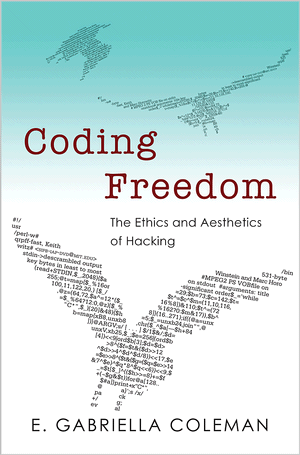E. Gabriella Coleman: Coding Freedom: The Ethics and Aesthetics of Hacking (2012–) [EN, SC]
Filed under book | Tags: · aesthetics, anonymous, anthropology, code, computing, ethics, floss, free software, hacker culture, hacking, intellectual property, internet, internet activism, software, web

“Who are computer hackers? What is free software? And what does the emergence of a community dedicated to the production of free and open source software–and to hacking as a technical, aesthetic, and moral project–reveal about the values of contemporary liberalism? Exploring the rise and political significance of the free and open source software (F/OSS) movement in the United States and Europe, Coding Freedom details the ethics behind hackers’ devotion to F/OSS, the social codes that guide its production, and the political struggles through which hackers question the scope and direction of copyright and patent law. In telling the story of the F/OSS movement, the book unfolds a broader narrative involving computing, the politics of access, and intellectual property.
E. Gabriella Coleman tracks the ways in which hackers collaborate and examines passionate manifestos, hacker humor, free software project governance, and festive hacker conferences. Looking at the ways that hackers sustain their productive freedom, Coleman shows that these activists, driven by a commitment to their work, reformulate key ideals including free speech, transparency, and meritocracy, and refuse restrictive intellectual protections. Coleman demonstrates how hacking, so often marginalized or misunderstood, sheds light on the continuing relevance of liberalism in online collaboration.”
Publisher Princeton University Press, 2012
Creative Commons Attribution-NonCommercial-NoDerivs 3.0 License
ISBN 1400845297, 9781400845293
264 pages
Responses: Jo Bates, Denisa Kera, Brett Lunceford, Jorge Luis Zapico, Alexander Halavais, Stéphane Leman-Langlois, Ethan Zuckerman
Reviews: James Grimmelmann (Jotwell: Cyberlaw, 2012), David Banks (Cyborgology, 2012), Eric Raymond (2013), Cade Metz (Wired, 2013), Mike Doherty (Hashbang, 2013), Bruce Byfield (Linux Mag blog, 2013), Bryan Behrenshausen (OpenSource.com, 2013), Roy S. Gutterman (Journalism & Mass Communication Q, 2014), Tim Jordan (American J Sociology, 2014), Emily T. A. Earl (Techno_ethno, 2014), Anne Elizabeth Yaniga (Techno_ethno, 2014), Sebastian Kubitschko (Culture Machine, 2014).
Coding Freedom (English, updated on 2013-1-18, PDF, EPUB [updated on 2014-9-2])
Kodiranje slobode. Etika i estetika hakovanja (Serbo-Croatian, trans. Ljubica Gotić and Predrag Todić, 2014)
The CryptoParty Handbook (2012)
Filed under handbook, sprint book | Tags: · anonymity, cryptography, email, encryption, floss, hacking, internet, open source, privacy, security, software, surveillance, technology, web

This handbook is designed to help those with no prior experience to protect their basic human right to Privacy in networked, digital domains. By covering a broad array of topics and use contexts it is written to help anyone wishing to understand and then quickly mitigate many kinds of vulnerability using free, open-source tools. Most importantly however this handbook is intended as a reference for use during Crypto Parties.
Facilitated by Adam Hyde
Core Team: Marta Peirano, Asher Wolf, Julian Oliver, Danja Vasiliev, Malte Dik, Brendan Howell, Jan Gerber, Brian Newbold,
Assisted by Teresa Dillon, AT, Carola Hesse, Chris Pinchen, ‘LiamO’, ‘l3lackEyedAngels’, ‘Story89’, Travis Tueffel
Creative Commons BY-SA 4.0 Unported license
386+ pages
via Julian Oliver
discussion and criticism (Liberationtech list)
Download the latest edition
Contribute (via GitHub)
Contribute (via Booki)
Culture Machine, 13: Paying Attention (2012)
Filed under journal | Tags: · attention, attention economy, floss, labour, networks, production, software

“This issue of Culture Machine sets itself two interrelated tasks in response to the scope and implications of these interrelated positions concerning attention, consciousness, culture, economics and politics. Firstly, it interrogates the notion of attention as it is elaborated in approaches to the attention economy and to media as forms of attention capture. The essays by three leading contributors to thinking in and around these themes, Bernard Stiegler, Tiziana Terranova, and Jonathan Beller, have such an interrogation as their principal task. They develop different, overlapping and sometimes contrasting perspectives on how a critical reposing of the question of attention might reframe its purchase on the central themes of the relation between interiority and exteriority, minds and media, economics and culture. The interview with Michel Bauwens, and the essays by Ben Roberts and Sy Taffel, are also working toward this end in that they identify various limitations and exclusions of the predominant articulation of the attention economy and move toward alternative, more productive, ethical or socially just formulations.
The second task of this issue is pursued in the essays of Tania Bucher, Martin Thayne, Rolien Hoyng and the three contributions to the additional section of the issue. These three – from Ruth Catlow, Constance Fleuriot and Bjarke Liboriussen – represent less scholarly but no less acute strategic inquiries into the thinking and re-making of what Stiegler calls attentional technics. Together, these contributions address particular instantiations of media forms, design practices and phenomena – from Facebook and Second Life to pervasive media design and Istanbul’s digitally mediated City of European Culture project – as a way of exploring and critically inflecting the implementation of the attention economy. This second mode moves from material phenomena to theoretical analysis and critique, while the first goes the other way. As we have argued, however, the necessity of the traffic between them is a central tenet of how we endeavour to pay attention to contemporary digital technoculture in this issue.” (from the introduction)
Edited by Patrick Crogan and Samuel Kinsley
Publisher Open Humanities Press
Open Access
ISSN 1465-4121
PDFs (updated on 2019-5-8)
Comment (0)
